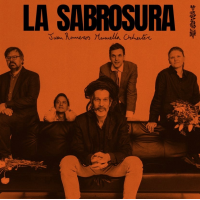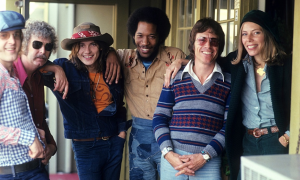Home » Jazz Articles » Profile » Ben Dixon
Ben Dixon
Playing the dances you would learn how to hold a beat.
“I was out a lot because I worked all the time,” Dixon remembers. “Whenever I was in the city we would speak to Alfred Lion at Blue Note and tell him we had put something together and if he agreed to it he would give us the okay to go ahead and rehearse the music.” The drummer not only helped organize sessions for the label, he wrote tunes for the dates. He began composing years before, inspired by a song Milt Jackson wrote for his mother. “It was so beautiful it inspired me to write a song for my mother.” Born in Gaffney, S.C. and growing up in Washington, D.C., Dixon remembers, “Always in my mother’s house I heard jazz. Swing and jazz and R & B.” The musicians who impressed him the most were Charlie Parker and Art Tatum. When he started playing drums he would slow down their records to examine the rhythmic intricacies of their playing and emulate them in the development of his own style.
The first drummer who impressed Dixon was Buddy Rich, whenever Jazz At The Philharmonic played D.C.’s Uline Arena. “I liked Buddy, but then when I heard Max it was all over. My main influences are Max, Art and Philly Joe. Those three kind of placed their imprint on me.” Dixon got his first paper set of drums when he moved to Buffalo, to live with his father, who played three string guitar and sang. After returning to D.C. he would practice on friends’ kits and began making some local gigs until he went to college on a basketball scholarship. In ‘55 Dixon came back to D.C., working in the post office for a while and gigging with Buck Hill and Shirley Horn using borrowed drums. Finally, he bought some drums and went to work with trumpeter Webster Young.
 In the summer of 1956 Dixon moved to New York to become part of the city’s burgeoning bebop scene. The following year he made his recording debut on Ray Draper’s Tuba Sounds for Prestige, with Jackie McLean, Mal Waldron, Spanky Debrest and Young. He was working regularly around New York and then in January of ‘58 he went out on the road with Lloyd Price, spending three years with the R&B legend. “It helped me become a better drummer, because we played mostly dances,” he says. “Playing the dances you would learn how to hold a beat. You would hold that beat and the rhythm that the people would be dancing to would get all into you, the imprint of the fabric of what you were doing. It helped me with my reading, it helped me with my arranging, it helped me with my composing. It just helped me all the way around musically.”
In the summer of 1956 Dixon moved to New York to become part of the city’s burgeoning bebop scene. The following year he made his recording debut on Ray Draper’s Tuba Sounds for Prestige, with Jackie McLean, Mal Waldron, Spanky Debrest and Young. He was working regularly around New York and then in January of ‘58 he went out on the road with Lloyd Price, spending three years with the R&B legend. “It helped me become a better drummer, because we played mostly dances,” he says. “Playing the dances you would learn how to hold a beat. You would hold that beat and the rhythm that the people would be dancing to would get all into you, the imprint of the fabric of what you were doing. It helped me with my reading, it helped me with my arranging, it helped me with my composing. It just helped me all the way around musically.” John Patton was the pianist in Price’s band. When Dixon left Price, the organ was beginning to become popular in jazz and he encouraged Big John to take it up. Eventually the two would join forces in Lou Donaldson’s group and the rest is Blue Note history. Throughout the ‘60s the drummer was busy recording regularly and touring periodically with Lionel Hampton. When his second daughter was born in July of 1962, Dixon didn’t get back home to see her until Christmas. That was enough for him. Gradually weaning himself from the jazz scene to raise his family, for 30 years he rarely played in public.
Then in 1997, retired from his city job with his children graduated from college, he picked up where he left off. Discouraged by the state of popular music he started a band and went into the schools with a program called Live at Lunch, to expose children to their cultural heritage. In 2000 he made his first record as a leader, Say Yes To Your Best , an organ trio outing. Recently at Fat Cat he fired up a night billed as a B-3 bash. Now he’s ready to bring his sextet in the club. “I feel the best way that I can leave a legacy as far as this music is concerned is to get the young cats with me and give them the benefit of my experience.” It’s the experience of a lifetime lived right without missing a beat.
Recommended Listening:
Ray Draper - Tuba Sounds (Prestige-OJC, 1957)
Grant Green - Grant’s First Stand (Blue Note, 1961)
Baby Face Willette - Stop and Listen (Blue Note, 1961)
Lou Donaldson - Natural Soul (Blue Note, 1962)
Harold Vick - Steppin’ Out! (Blue Note, 1963)
Ben Dixon - Say Yes To Your Best (American Classical Jazz, 2000)
Tags
PREVIOUS / NEXT
Support All About Jazz
 All About Jazz has been a pillar of jazz since 1995, championing it as an art form and, more importantly, supporting the musicians who make it. Our enduring commitment has made "AAJ" one of the most culturally important websites of its kind, read by hundreds of thousands of fans, musicians and industry figures every month.
All About Jazz has been a pillar of jazz since 1995, championing it as an art form and, more importantly, supporting the musicians who make it. Our enduring commitment has made "AAJ" one of the most culturally important websites of its kind, read by hundreds of thousands of fans, musicians and industry figures every month.

























